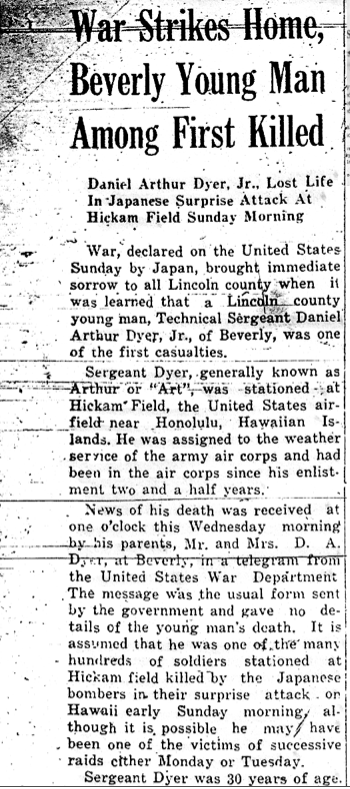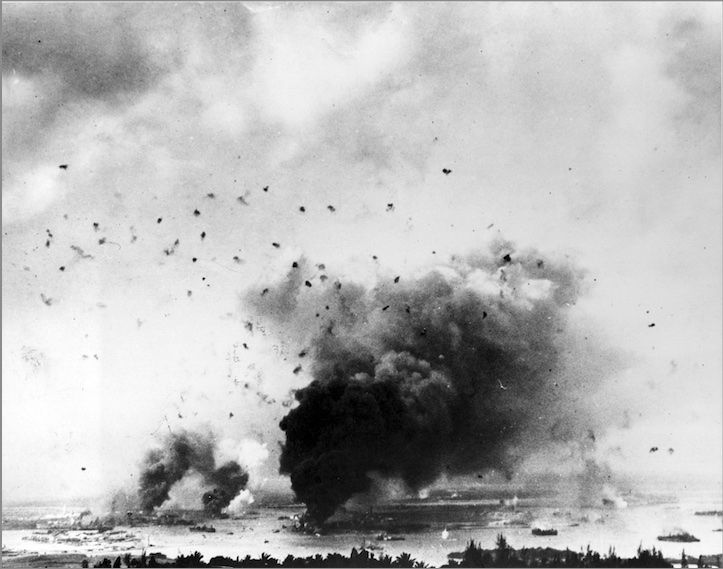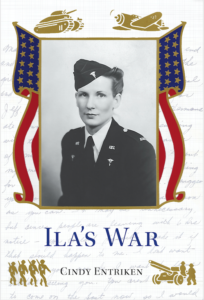View of Pearl Harbor looking southwesterly from the hills to the northward. Taken during the Japanese raid, with anti-aircraft shell bursts overhead. Large column of smoke in lower center is from USS Arizona (BB-39). Smaller smoke columns further to the left are from the destroyers Shaw (DD-373), Cassin (DD-372) and Downes (DD-375), in drydocks at the Pearl Harbor Navy Yard.1
————————-
In recognition of the 81st anniversary of the bombing of Pearl Harbor, today’s blog is about two men from Lincoln, Kansas – one at Hickam Field, the other at Pearl Harbor – and how some Lincoln residents learned of the event.
Hawaii, Sunday, December 7, 1941
7:55 a.m. Hawaii time; four hours later, 11:55 a.m., central standard time for Lincoln, Kansas
Army Air Corps Seventh Weather Squadron, Hickam Field, Oahu
Daniel Dyer, Jr., a Technical Sergeant from Lincoln County, Kansas, and a weather forecaster with the 7th Aircraft Squadron, Army Air Force, at Hickam Field, was on duty the evening of December 6, 1941, “laboring over and analyzing midnight and early morning weather maps that” showed a large storm system that had developed northwest of the Hawaiian Islands.”2 After his duty ended on Sunday morning, December 7, he joined four of his buddies – all weather forecasters or observers – and walked toward the mess hall for breakfast. Tragically, they were “caught . . . in the open on the edge of the parade ground”3 and died.
uss Nevada, Pearl Harbor
Meanwhile, approximately two miles away, Warrant Officer Machinist Donald Kirby Ross, from Beverly, Kansas, in Lincoln County, was fighting for his life and the life of his shipmates on the USS Nevada (BB-36) “When his station in the forward dynamo room of the U.S.S. Nevada became almost untenable due to smoke, steam and heat, . . . Ross forced his men to leave that station and performed all the duties himself until blinded and unconscious. Upon being rescued and resuscitated, he returned and secured the forward dynamo room and proceeded to the after dynamo room where he was later again rendered unconscious by exhaustion. Again recovering consciousness he returned to his station where he remained until directed to abandon it.”4
Lincoln, Kansas, Sunday December 7, 1941
1:00 p.m. Lincoln, Kansas time; 9:00 a.m. Pearl Harbor Time
Sunday dinner at Ira’s Lunch was always busy because Florence Armsbury, my great grandmother, was a fabulous cook who was well-known for her fried chicken, the Sunday dinner special. The restaurant was packed because many local families had decided to eat out on December 7, 1941, in celebration of the second Sunday of advent. Area congregations in their respective churches watched as the second advent candle was lit and special prayers and readings were given to note the advent season. Besides lighting the candle, the Methodists sang that gorgeous advent hymn “O Come, O Come, Immanuel”.
By 1:00 p.m. the last customers had paid their tabs and hurried home for leisurely Sunday afternoon naps. My mom, Donna Farrington, age 15, was working in the kitchen, washing mounds of dirty dishes. Her grandmother, Florence, was cleaning the huge black gas range that was spattered with grease from frying chickens all morning. They’d just turned off the radio after listening to the symphony, one of their favorite Sunday activities, on a Chicago station.
Out in front, Wava Farrington, Donna’s mother and Florence’s oldest daughter, was totaling up the receipts for the day’s sales. Wava’s husband, Nolan, was wiping off the tables and chairs in preparation for sweeping the floor. Everyone was tired and looking forward to going home.
“We were just finishing up,” my mom told me when I interviewed her about how the family heard that Pearl Harbor had been bombed, “when Harry Liggett burst through the front door of the restaurant and said, ‘Have you heard the news?’ We all shook our heads ‘no’ and asked ‘what news?'”
“‘The Japs,’ he said. ‘The Japs just bombed Pearl Harbor and my brother is there.’ Then he rushed back out.”
“We turned the radio back on and listened to it the rest of the day. That’s how we learned about Pearl Harbor”.5
December 9, 1941
After my grandmother, Wava Farrington, died in 2004, I found a few pages from a diary that she had started in the days after the bombing of Pearl Harbor.
Already we are feeling the direct effects of war. Several Lincoln County boys are in the danger zone. . . . The Dyer boy from Beverly was killed. His parents being notified today. Our Christmas program was discontinued when an order from [sic] Federal Government stopping all activities connected with shortwave broadcasting. The banning of the radio activity is one of the first acts of a nation at war. The broadcasts can not easily be censored and might be used by aliens to give out vital information. Such broadcasting might also use wave lengths needed for military communication. . . .6
December 11, 1941
The news of Daniel Dyer’s death made the front page of the Lincoln paper.7

April 18, 1942
For courageous conduct, Donald Ross was awarded the Medal of Honor by Admiral Chester Nimitz. Ross was the first World War II recipient of the medal.8
2011
In 2011 a portion of Kansas highway 18 “from the US-81 interchange to the Lincoln/Russell County line” was renamed the Donald K. Ross Memorial Highway.9
1https://www.history.navy.mil/our-collections/photography/wars-and-events/world-war-ii/pearl-harbor-raid/overall-views-of-the-pearl-harbor-attack/80-G-40056.html (accessed 12/7/21)
3Ibid.
4https://cindyentriken.com/2014/12/pearl-harbor-two-days-later/
5https://cindyentriken.com/2014/12/pearl-harbor-december-7-1941/
6Unpublished papers of Wava Farrington. You can read more about this at: https://cindyentriken.com/2014/12/pearl-harbor-two-days-later/
7The Lincoln Sentinel-Republican, vol. 53, no. 50, December 11, 1941.
8https://www.kshs.org/kansapedia/donald-k-ross/16880 (accessed 12/7/21)
9https://cindyentriken.com/2014/12/pearl-harbor-two-days-later/



As always, interesting memories of people who either witnessed the Japanese attack or who heard about it … great stories – thanks for sharing Cindy – best regards, Alain
THANK YOU FOR REMEMBERING ALL THOSE WHO GAVE UP THEIR TOMORROWS FOR OUR TODAYS.
Well done! Thank you Cindy. 🙂
I read this to Mike while driving down the highway and we were both impressed to hear about Donald Ross being the first recipient of the Medal of Honor during WWII. Great article!
Thanks, Kathy. I’m glad you and Mike enjoyed the article. It’s always fun for me to do research and write up what I’ve learned.
Thanks, Barry. All those research and writing classes we took finally have paid off! Best Regards.
Jerry, thanks for writing. Like you I know I have todays and tomorrows because of the sacrifices of others who went before me!
Alain, thank you for writing. I know you, too, value history and have done your own tremendous work in preserving history for the next generations.
It was a somber visit to the USS Arizona and museum many years ago but your blog gave me a more personal visit when you told of how it affected those two men from Lincoln, Kansas. An example of how many, many families felt as they received the bad news. Thank you. I grew up in an Air Force town in Ontario, Canada, so military men and women were always important to me. A second cousin enlisted in the RAF and was the first Canadian pilot to lose his life when he was shot down over Britain. So many families lost loved ones.
Gail, thank you so much for your comments. Based on what you wrote, it seems my blog helped make your visit come alive, and that is the highest compliment a writer could receive. My mom’s sister married a man who spent his career in the U. S. Air Force so my cousins grew up on Air Force military bases all over the U. S. My uncle did three tours in Viet Nam and while he physically survived the war, he was never emotionally the same. Lots of ways to lose loved ones in war. Thanks again for writing and take care.
Thank you for your comments, Gail. Please accept my condolences for your family’s loss of a cousin killed during the war. I know how the loss of a loved one can resonate through generations so that a death, even one from 80+ years ago, can feel so recent and so raw. Thank you for writing. Best Regards. Cindy